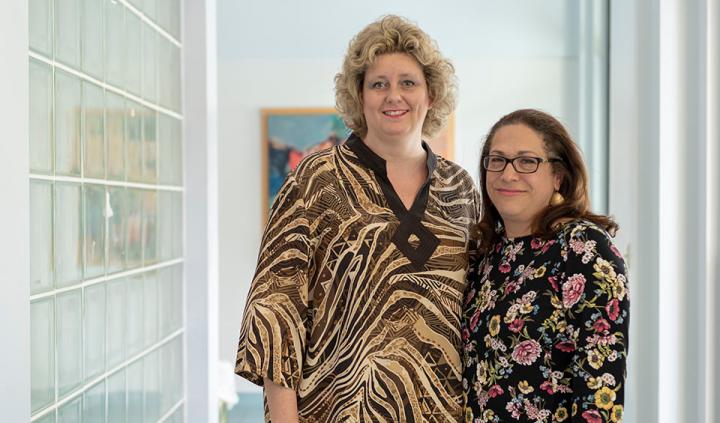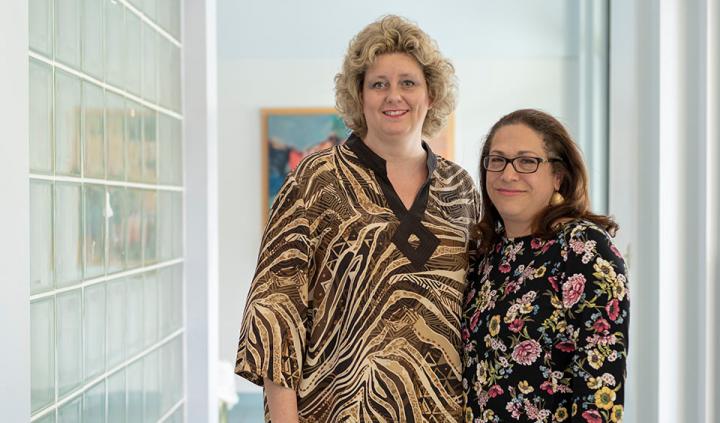
Credit: Medical University of South Carolina Hollings Cancer Center
A team of Medical University of South Carolina (MUSC) Hollings Cancer Center researchers received a three-year, $1.2 million grant from the U.S. Department of Defense (DOD) to test a potential therapeutic antibody that could block breast cancer growth with fewer side effects, opening up potential for future drug development. The team will deploy innovative molecular imaging tools to study a crucial mechanism that appears to drive tumor development.
The study aims to find better ways to treat metastatic breast cancer that could replace current therapies, some of which have life-threatening side effects. Core to the work is Hollings Cancer Center researcher Nancy DeMore, M.D., a leading expert in angiogenesis and therapeutics created for breast cancer.
Angiogenesis, a key phase in malignant growth, involves how blood vessels form, develop and create a network to perfuse different types of solid tumors. Tumors need a blood supply to receive their nutrients and also as an escape route to metastasize to other organs, explains Ann-Marie Broome, Ph.D., director of HCC's Small Animal Imaging Center, who's also involved with the study and part of MUSC's Department of Cell and Molecular Pharmacology & Experimental Therapeutics.
"We have a great team assembled to study this. The power of molecular imaging is clear. We believe that if you can see it, you can dissect its mechanism of action then treat it and attack it. That's the greatest impact I see for translational imaging studies. That's why I'm excited."
Traditional chemotherapeutic drugs kill rapidly dividing cancer cells, but they can also destroy or damage many healthy cells. Developing less toxic interventions requires changing the target from rapidly-dividing cells to one that is specifically expressed in tumors and not in normal tissue.
DeMore's laboratory is studying the role a novel angiogenesis factor, a protein known as secreted-frizzled-related protein 2 (SFRP2), plays in breast cancer. "The SFRP2 protein is overexpressed in tumor vessels, and later we found that it was overexpressed in a wide variety of tumors, including breast cancer," said DeMore, who holds the BMW Endowed Chair in Cancer Research at MUSC.
The thought is to inhibit reactions downstream from SFRP2, selectively blocking tumor blood vessels from growing and reducing toxicity to normal tissue.
In preclinical studies, DeMore's laboratory discovered that a SFRP2 protein has a novel function. The protein activates a mechanism called calcineurin/NFAT, which is critical in blood vessel and tumor growth.
Now the Hollings Cancer Center team seeks to test whether the calcineurin/NFAT mechanism, rather than other potential mechanisms, is driving breast tumor growth, and whether tumor development can be blocked by targeting this pathway. The researchers have developed a novel humanized antibody that has already proved effective in blocking the calcineurin/NFAT pathway and tumor development in cultured human cell models of breast cancer.
"We hope to find out whether our antibody inhibits tumor growth through the calcineurin/NFAT pathway instead of other pathways," DeMore said.
The researchers plan to study the humanized antibody in an animal model to learn whether it disrupts the calcineurin/NFAT mechanism, preventing in vivo tumor growth while leaving normal tissue unaffected. Broome said the antibody recognizes a protein found on blood vessels.
"By impacting angiogenesis and blood vessel stability within tumors, we can alter the way these tumors are able to survive in the presence of that antibody. We're creating a fine balance between cutting off the nutrients and normalizing the vasculature so that the tumors are less likely to progress."
The researchers will use real-time fluorescence imaging systems to highlight and reveal interactions among protein pathways within tumors that have not been seen using other methods. "The fluorescent systems, which are one of the most sensitive imaging tools available, give us faster, clearer images and more specific answers to the questions that we are asking," Broome said. "It's not enough just to know that there is a therapeutic response to the antibody. We want to know why and where there is a response."
The researchers will corroborate fluorescence imaging findings with other modalities, such as computed tomography (CT) images and bioluminescence tools. Tracking SFRP2 pathways with innovative imaging tools could eventually help clinicians track tumor growth and monitor response to chemotherapy. Another aim of the study is to combine the humanized antibody with other drugs commonly used for breast cancer and look for an additive or synergistic effect.
The DOD grant also supports a related study by Shikhar Mehrotra, Ph.D., investigating whether SFRP2 may also play an important role in immune cell function.
A potential treatment is not yet available for human studies, but the team plans to obtain funding for further drug development that could lead to a Phase I clinical trial.
###
About MUSC Hollings Cancer Center
The Hollings Cancer Center at the Medical University of South Carolina is a National Cancer Institute-designated cancer center and the largest academic-based cancer research program in South Carolina. The cancer center comprises more than 100 faculty cancer scientists and 20 academic departments. It has an annual research funding portfolio of more than $40 million and a dedication to reducing the cancer burden in South Carolina. Hollings offers state-of-the-art diagnostic capabilities, therapies and surgical techniques within multidisciplinary clinics that include surgeons, medical oncologists, radiation therapists, radiologists, pathologists, psychologists and other specialists equipped for the full range of cancer care, including more than 200 clinical trials. For more information, visit http://www.hollingscancercenter.org
Media Contact
Dawn Brazell
[email protected]
843-792-3622
@muschealthpn
http://www.musc.edu
Original Source
http://academicdepartments.musc.edu/newscenter/2018/hcc-metastatic-breast-cancer/index.html





